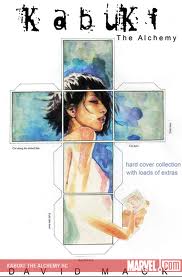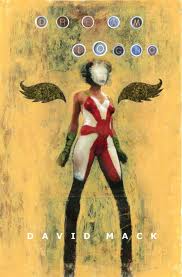Comics /
Back Issues
Backissue Retrospective: On David Mack and "Transcending"
By Dan Horn
June 7, 2012 - 13:27
Quite a while ago, I had spoken with writer and artist David Mack about
his work on the graphic adaptation of Philip K. Dick's science-fiction
short
The Electric Ant. Mack had enjoyed my analysis of his book, and
wondered if I could take a look at a few issues of Dream Logic and the
newest print of the Kabuki: The Alchemy collection and give him some
feedback.
That was last July.
As my colleague Andy Frisk has noted in his column, many of us comic
book pundits work for satisfaction alone. We love comic books, and
thusly we love to talk about them. We're not getting paid a single
tarnished cent to share our thoughts on the subject; we just feel
impelled to do so, and we are exceedingly grateful to our
editor-in-chief for the opportunity and the means to do so.
Unfortunately, because we have other professions and obligations, there
aren't enough hours in the day for some of us to get around to sharing
those thoughts. That happened to be my quandary at the time of David's
request. I was working--and am still working--on completing my own
artistic and creative endeavors, I was separating from the military and
shaking off all of the administrative tangles that grueling process
includes, and I was preparing for my first semester of college. So, I
reluctantly shelved my OpEd on David Mack and the connotations of his
work in regard to the comic book medium.
Now, after perusing another issue of Dream Logic, I feel a certain
responsibility to myself, and perhaps to the comic book medium itself,
to put my thoughts down on paper, however digital and however
insubstantial in the constant deluge of mainstream comic promotion. So,
without any further delay, I set about to writing...
Author Peter Straub would say that the easiest, perhaps laziest,
evaluation a critic can give something that he/she deems rare or
original is to say that it "transcends" its genre or even its medium.
I'd have to agree with him in almost any context. Most works, whether
literary or otherwise creative, that we hastily label as "transcendent"
are perhaps anything but. They merely bleed the untapped or
underutilized potentiates from their media reservoirs, in turn
representing the most exceptional, exemplary uses or manipulations of
their respective artistic conduits. Peter Straub's own groundbreaking
work in horror fiction was accused many times of transcending the horror
genre, but it didn't. Straub's work was simply better than the
mediocrity to which niche readers had grown accustomed. It restored
horror's literary appeal, harkening back to Poe and Stoker, evoking
themes of dark fantasy, instead of following the trend of lurid
superficiality and cheap shock fiction for which the genre had become a
bastion.
 |
Similarly, David Mack's Kabuki catalogue and his ongoing Dream Logic
series recall the unmapped potentiate of comic books. Kabuki: The Alchemy in
particular evokes a surreal collage of the human subconscious under a
thin, almost nonexistent gauze of narrative, loosely resembling
mainstream linearity.
When writer/artist David Mack asked for my opinion on his lauded graphic
album Kabuki: The Alchemy, I knew I had a daunting endeavor ahead of me.
Alchemy had been put through the critical wringer and then some a few
years back. So, what could I say about Mack's work that hadn't already
been said? I could have very easily branded it as "transcending comic
book conventions," but I'd have to be uninformed to label it as such.
The comic book medium has a wealth of diverse and brilliant creative
talent. It might as well be said that most of the genre transcends the
very perception that mainstream consumers must have of it. I could have
just as easily strung together a bunch of review cliches, including the
word "transcendent," and made just as much money as a soldier, a
teacher, or a social worker as I churned out half-assed critiques for
The New York Times or Rolling Stone.
Alchemy immediately got me to thinking about the quality of a work and
that quality's association with advertising. I believe the contemporary
American barometer for the success of a work is commerciality. Notice
the scores of comic books that flood the market each year with nothing
but the utmost commercial appeal. It gets to the point that the consumer
even begins viewing certain mainstream works as something other than
mainstream because of those works' slightly less culpable commerciality.
 |
What does commerciality mean in terms of art, then? This was a question
that wriggled around uncomfortably in my skull for a minute or two, and
then I was reminded of the city of Sao Paulo. In 2006 Sao Paulo passed
the Clean City legislature, which eventually eliminated advertising
within the city: no bus or taxi ads, no billboards, no posters, no
sandwich boards. It sounds impossible, and maybe therein lies the
problem. We're so inundated with advertising we can't imagine industry
without it. However, the singular implication of the Clean City law that
struck me as the most interesting was that, without the ability to
advertise, businesses were forced to make products with greater quality
than the goods they hocked preceding the law. Word-of-mouth became the
new billboard, the new taxi ad, culturally diffusing a business's repute
based solely on the merit of its services rendered. Commerciality means
mass production and mediocrity, a quality that becomes accepted by a
consumer generation over time and is therefore unquestioningly inherited
by the following generation. We have magazines and dozens of websites
dedicated entirely to constant promotion and advertising of comic books.
The more commercial appeal a comic book retains, the more coverage it
receives and the more successful that book becomes. Commercial appeal in
the medium often, lamentably, also equates to genre conventions that
don't offer very redeeming self-representations of comic books.
Then along comes something like Kabuki: Alchemy, which shocks even the
stiffest detractors of the comic book medium out of their commercially
induced comas. "What the hell is this?" they ask. "This can't be a comic
book. It doesn't objectify women or appeal to our reptile brains. It
isn't garish or unsubtle. It invokes qualities of fine art. It
TRANSCENDS comic books."
My stomach turns at the word.
"Transcends." It's a common enough assessment of an artistic effort in
any media, but I've been reading comics since before I could serviceably
read. I have a firsthand knowledge of the potential of the medium, and I
feel some strange and chivalrous charge to defend the honor of this
pop-cultural niche. There's no shortage of artistic and literary
inspiration within comic books; this I know for certain. So, why do
others not attribute exemplary works like Alchemy, Mazzucchelli's
Asterios Polyp, or Burns' Black Hole to the comic book medium?
The answer lies in the commercial assertion of that medium itself, and
the troubling trend of works that lack that commerciality falling into
the domain of hipster cult and abstruseness, or being attributed to an
entirely different arena of sequential art: the "graphic novel." How
sophisticated! Perhaps Alchemy and Dream Logic are themselves abstruse
and sophisticated, or is that something mainstream audiences are simply
led to believe by marketing? And without overbearing advertising, would
those books be less abstruse? Would my non-hipster word of mouth be
enough to goad mainstream readership into picking up an issue of Mack's
Dream Logic? Would those readers, unaffected by incessant commercial
irradiation, say, "This is different from anything I've read before, but
it's not inaccessible, and it's beautiful"? Would the genetic strands
of "comic book" be more easily discernible within the "graphic novel"?
Or is mass appeal--entertainment value--wholly irreconcilable with art?
Last Updated: January 17, 2025 - 08:20



